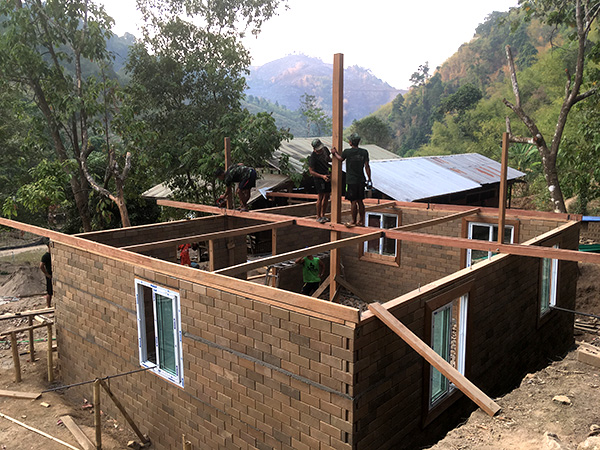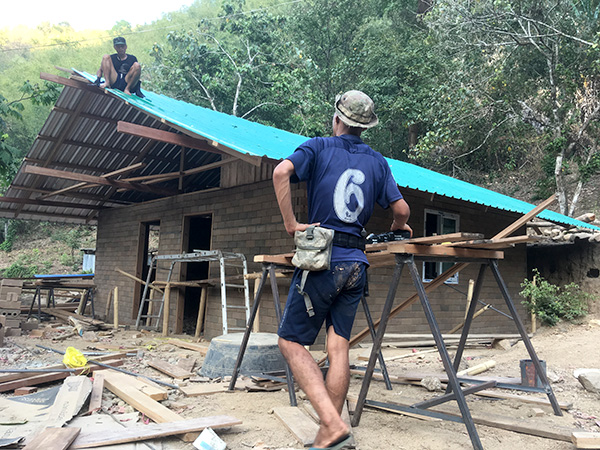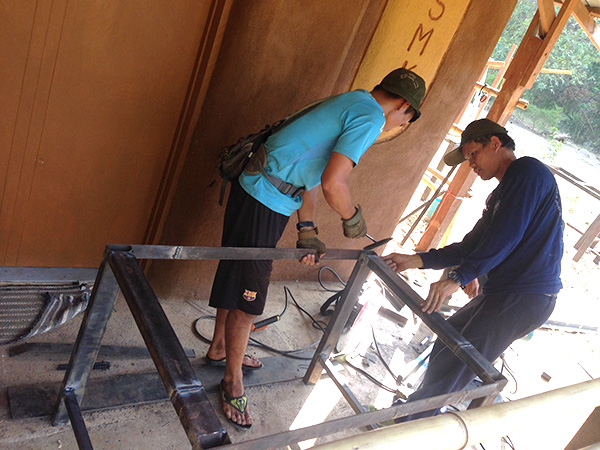Improving Sustainability at the Jungle School of Medicine – Kawthoolei
15 May 2019
Karen State, Burma
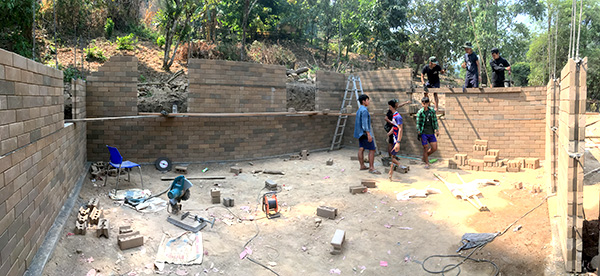
Jungle School of Medicine – Kawthoolei’s (JSMK) campus was carved out of dense jungle in a lush stream-split valley. There were no roads for miles and simply getting food to the campus was difficult. Over the years, the Karen have built a road network that passes within a couple hours’ walk of JSMK. While JSMK has intentionally decided to not have car, or even motorbike, roads access the campus in an effort to keep it undisrupted by dusty roads with cars and motorbikes whizzing past, it has become much easier to get supplies in.
Much has changed since the first tree was cut and first house site cleared. Now there is a hospital, an earthbag-constructed operating room, an outpatient building, classroom, multiple staff houses and student dorms, kitchens, toilets. It is a small village.
Three years ago as JSMK continued to grow and see more patients, we decided that to improve JSMK’s medical capacity we needed to also improve JSMK’s infrastructure, with a goal toward the long-term sustainability of our presence in the area. The first project that needed to be addressed was electricity.
Acute respiratory infections (ARI) are a very common complaint of the patients who come to our clinic. ARI can often turn into pneumonia and pneumonia can quickly become deadly for children. The best treatment for this is concentrated oxygen, sometimes for days at a time. To run the oxygen concentrator, we had to run the generator – and that meant carrying in fuel and dealing with fickle machines that often break down. It was a five- or six-hour round-trip hike for one person to carry a day’s worth of fuel.
So, with the goal of being able to run the oxygen concentrator, we installed a large solar system that generated enough electricity to power it. The day the installation was finished the first test came: a baby arrived with severe pneumonia. The new solar and battery system ran the concentrator for 20 out of 24 hours. Instead of needing 24 hours of fuel we only needed four. This was a huge improvement and confirmed our proof of concept. We continued to expand our system until we had 7,000 watts of photovoltaic panels and 30,000 watt/hours of storage.
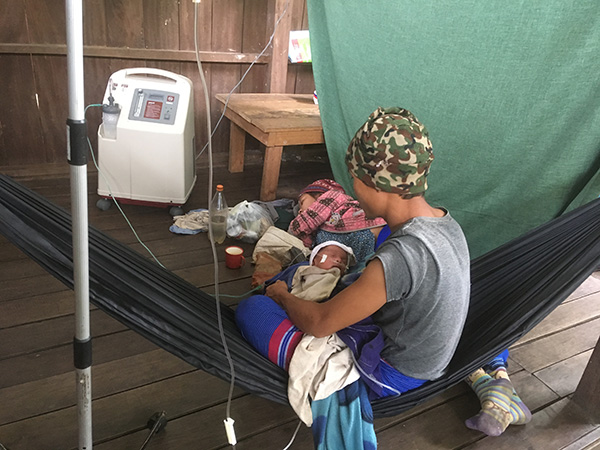
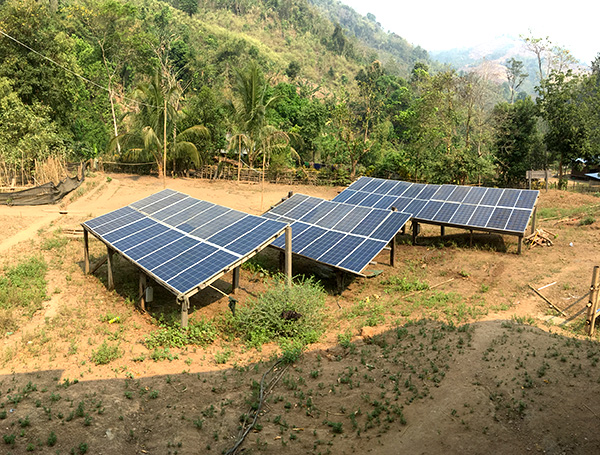
Having electricity has opened up many other options for our campus. We have lights so the students can study at night. We can weld and build out of steel as needed. Families can use electric rice cookers and hot water pots, reducing the amount of wood they need to burn to cook, as well as how smoky their homes are. This improves the health of our staff and students, as well as reducing deforestation near the campus.
In line with reducing smoke and consumption of firewood, we have also begun to make the use of propane bottles for gas cooking an option for families there.
A biochar water filter was installed at JSMK in 2016 as a way to have clean water without boiling it. The filter system requires maintenance once a year, to change out the charcoal, and provides clean drinking water all year long. This reduces the need for firewood and promotes good hydration and healthy living for our staff, students and patients. We have added a garden and fishpond for food for the students and instructors living there.
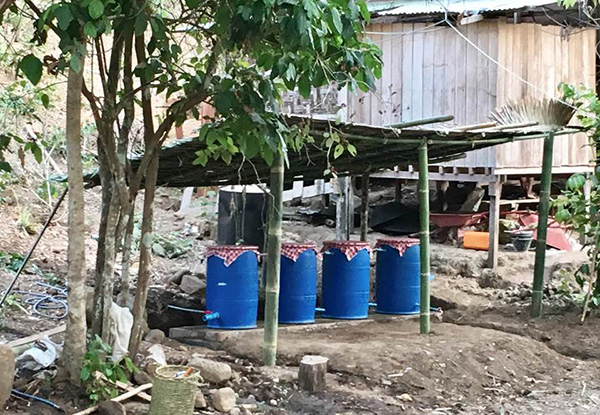
A suspension bridge that had been built many years previously got an upgrade in 2017 so that horses and mules could cross it. However, in 2018, the rainy season was exceptionally heavy and the river rose high enough to wash the bridge out. In fall of 2018, we built a new bridge in a different location that is higher, wider, and more stable. The bridge is used regularly by villagers during rainy season as it is often the only way to cross the river, and it is vital for JSMK logistics of getting medicine and evacuating patients.
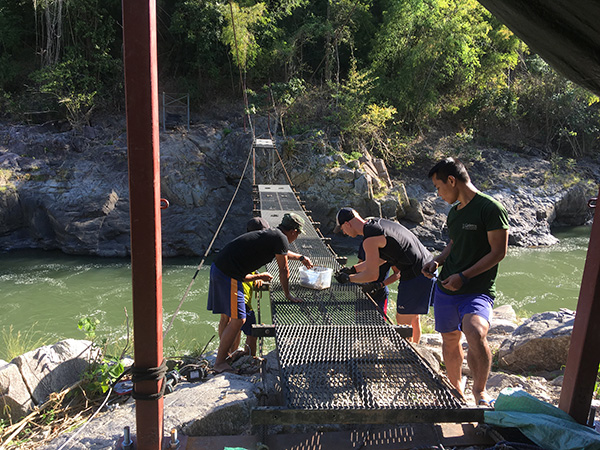
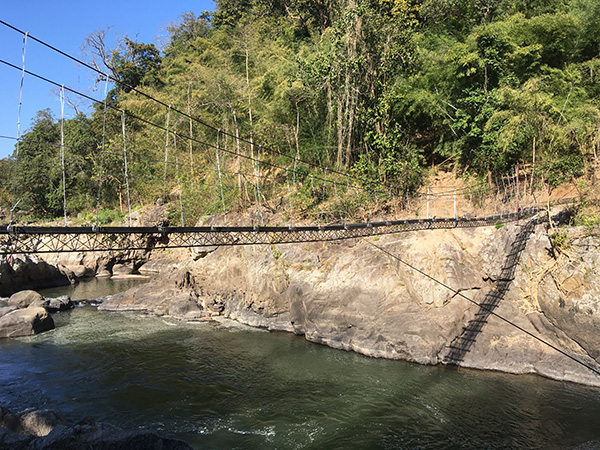
Our water is gravity fed through pipes from up river. During rainy season often the inlet pipes will get washed away so we installed a holding tank and tapped into another input source (a spring up the side of the mountain) so we can continue having water even if the main inlet gets washed out in the floods.
In 2019, we built our first brick building. We carried in a 400-pound brick press and a pulverizer machine to make earth/cement interlocking bricks. We decided to use brick so that we could have a building with minimal dust. It will be used as the lab for doing more advanced diagnostics, as well as a dental clinic and operating room for cataract surgeries. Over the next couple of months we will finish the interior of the building by adding electricity, plumbing, counter space and storage space. We are excited to see what having a vastly-improved lab can mean for accurately diagnosing our patients’ diseases.
JSMK is growing. The jungle has been pushed back up the hill and houses, classrooms, and a 12-bed hospital have taken its place in the valley. JSMK is a place where we not only heal the sick and teach new medics, but also strive to be a community that sets an example of how to live well and healthily together and on the land. This includes having a clean village, piping water into houses, building with new methods and tools that are sustainable, having a simple but effective water filter, and using energy from the sun to power our homes. Seeing the advances at JSMK, different villages and schools have asked FBR and JSMK to help them with installing solar systems and water filters, which we have gladly done. It is a slow process, but we are happy to help Karen State implement creative and responsible ways of developing with a focus on improving the physical health of the villagers and sustaining the land.

